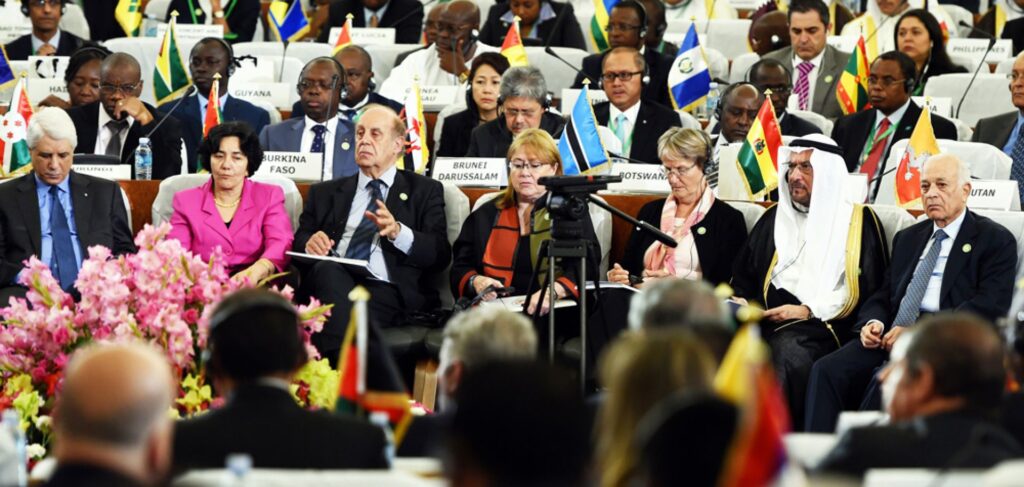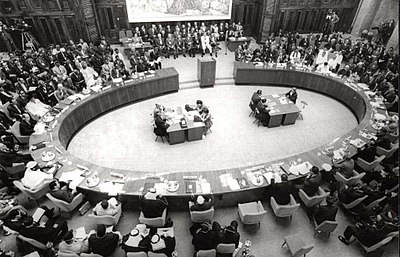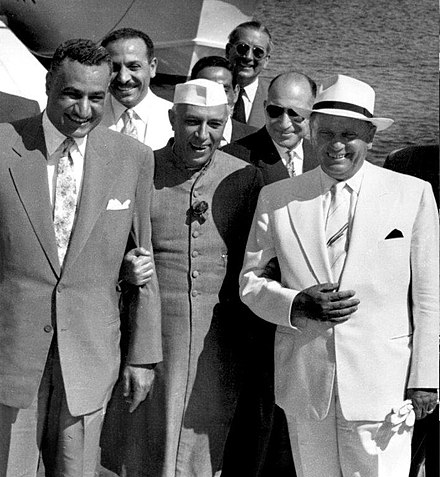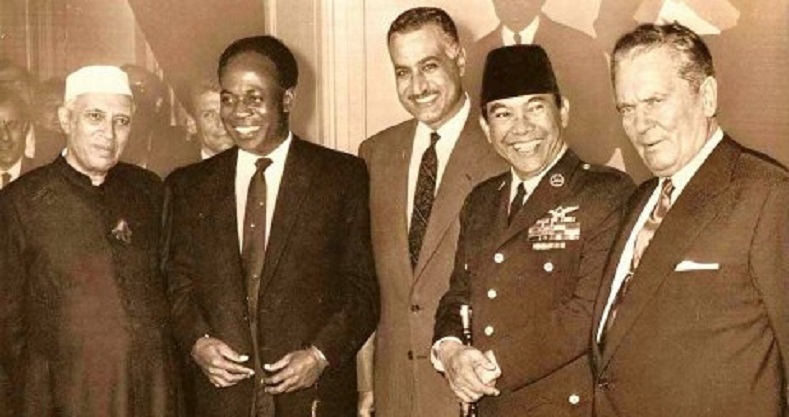Have you ever heard of the Non-Aligned Movement? It’s this fascinating global organization that brings together countries from all over the world, without aligning themselves with any major political power. And guess what? Suriname has played a significant role in this movement. In this article, we’re going to dive deep into Suriname’s involvement in the Non-Aligned Movement and how it has shaped the country’s diplomatic stance.
Now, you might be wondering, what exactly is the Non-Aligned Movement? Well, it was founded back in 1961 during the height of the Cold War. The idea behind it was to create a platform for countries that didn’t want to align themselves with either the United States or the Soviet Union. Suriname, in particular, saw the Non-Aligned Movement as an opportunity to maintain its independence and establish diplomatic relationships with other nations. As a small nation, it was important for Suriname to have a voice on the global stage and the Non-Aligned Movement provided just that.
Throughout its history, Suriname has actively participated in the Non-Aligned Movement, attending conferences and taking part in discussions on various global issues. This involvement has allowed Suriname to interact with other countries that share its goals of promoting peace, economic development, and the rights of small nations. By being a part of this movement, Suriname has been able to establish itself as an independent player in the international arena. So stay tuned, because in the upcoming article, we’ll delve deeper into Suriname’s specific contributions to the Non-Aligned Movement and the impact it has had on the country’s foreign policy.

Introduction
In the global arena, the Non-Aligned Movement (NAM) has played a significant role in shaping international relations and promoting peaceful coexistence. The movement emerged during the Cold War as a response to the bipolar world order dominated by the United States and the Soviet Union. Suriname, a small country located in South America, has been an active participant in the NAM since its admission in the early years. This article explores the history, leadership roles, regional dynamics, contributions, economic initiatives, and challenges faced by Suriname as a member of the Non-Aligned Movement.
Emergence and Purpose
The Non-Aligned Movement was formed in 1961 by a group of nations seeking to establish a global alliance that would not align with either the United States or the Soviet Union. The key purpose of NAM was to promote and safeguard the interests of the developing countries by advocating for their political independence, sovereignty, and territorial integrity. Suriname, like many other nations, joined NAM to have a collective voice in the international arena and preserve its autonomy in foreign relations.
Key Founding Members
The initial members of the Non-Aligned Movement included leaders from countries such as India, Yugoslavia, Egypt, Indonesia, and Ghana. They played pivotal roles in shaping the foundations of NAM and advocating for the principles of non-alignment. Suriname, at the time known as Dutch Guiana, was not a part of the founding members, but it later gained its admission and became an active participant.
Influence During the Cold War
During the Cold War, Suriname’s membership in the Non-Aligned Movement provided the country with a platform to voice its concerns regarding the superpower rivalries and their impact on smaller nations. Suriname emphasized the importance of maintaining neutrality and non-interference in the internal affairs of sovereign nations. By actively participating in NAM summits and conferences, Suriname was able to contribute to the movement’s efforts in reducing tensions and promoting global peace.
Evolution Post-Cold War Era
After the collapse of the Soviet Union and the end of the Cold War, the global dynamics changed significantly. The Non-Aligned Movement had to adapt to the new geopolitical landscape and redefine its role in a multipolar world. Suriname, along with other member states, played a crucial role in redefining the movement’s objectives to address the emerging global challenges. This evolution allowed Suriname to continue contributing to the NAM’s goals of promoting equality, justice, and sustainable development.
Suriname’s Motivation for Joining
Suriname’s decision to join the Non-Aligned Movement was motivated by several factors. First and foremost, it was aligned with the country’s foreign policy objectives of maintaining independence, sovereignty, and neutrality. As a small nation, Suriname recognized the need to align itself with other like-minded countries to amplify its voice and influence in the international arena. Joining the NAM also provided Suriname with an opportunity to strengthen its diplomatic ties and benefit from the solidarity and support of fellow non-aligned nations.
Process of Admission
Suriname became a member of the Non-Aligned Movement in [insert year]. The process of admission involved a series of diplomatic negotiations and consultations between Suriname and the existing member states. Suriname had to demonstrate its commitment to the principles of non-alignment and present its case for joining the movement. After a thorough review of Suriname’s credentials and objectives, the country was officially admitted into the NAM, allowing it to actively participate in the movement’s activities and decision-making processes.

Suriname’s Role in Early Years
In the early years of Suriname’s membership in the Non-Aligned Movement, the country actively engaged in various initiatives aimed at promoting peace, disarmament, and socio-economic development. Suriname leveraged its position within the movement to advocate for the rights and interests of small and developing nations. As a proponent of South-South cooperation, Suriname forged alliances and partnerships with other non-aligned countries, forming a basis for mutual support and collaboration.
Suriname’s Role in Major Decision-Making
Suriname actively participated in decision-making processes within the Non-Aligned Movement. Through its engagement in NAM summits and conferences, Suriname had the opportunity to contribute to the formation and implementation of policies related to global peace, disarmament, and socio-economic development. Suriname’s input and perspectives were valued by other member states, as it brought unique insights and experiences as a small, developing nation.
Participation in Summits and Conferences
Suriname’s active participation in NAM summits and conferences allowed the country to engage with world leaders, exchange ideas, and strengthen diplomatic ties. These forums provided Suriname with a platform to address global challenges, share its experiences, and advocate for its interests. Suriname’s presence was significant, as it demonstrated the country’s commitment to the principles of non-alignment and its determination to contribute to the objectives of the Non-Aligned Movement.
Contribution to Peacekeeping Initiatives
Suriname has made valuable contributions to peacekeeping initiatives within the Non-Aligned Movement. As a nation that has had its fair share of internal conflicts, Suriname understands the importance of maintaining peace and stability. Suriname actively supports the NAM’s efforts in mediation, conflict resolution, and peacebuilding. Through its participation in regional peacekeeping missions, Suriname has demonstrated its commitment to peacekeeping and its willingness to contribute to the global effort in ensuring peace and security.
Collaboration Within the Caribbean Community
Suriname’s membership in the Non-Aligned Movement has strengthened its collaboration within the Caribbean community. As an active participant in NAM, Suriname has had the opportunity to engage with other Caribbean nations, share common challenges, and explore opportunities for cooperation. Together, these nations have advocated for the interests of the Caribbean region within the Non-Aligned Movement, ensuring that their voices are heard and their concerns are addressed.
Partnerships with South American Nations
Suriname’s involvement in the Non-Aligned Movement has also fostered partnerships with other South American nations. Through bilateral and multilateral engagements, Suriname has explored avenues for collaboration in various sectors, such as trade, investment, education, and cultural exchange. These partnerships have not only strengthened Suriname’s regional ties but have also contributed to the overall goal of promoting South-South cooperation and mutual development.
Relationship with Other Non-Aligned Countries
Suriname maintains strong relationships with other non-aligned countries outside of its immediate region. Through its active participation in the Non-Aligned Movement, Suriname has forged alliances and friendships with nations from different continents. These relationships have provided Suriname with opportunities for economic cooperation, cultural exchange, and diplomatic support. By engaging with other non-aligned countries, Suriname has been able to expand its diplomatic horizons and advocate for its interests on a global scale.

Impact on Foreign Policy
Suriname’s membership in the Non-Aligned Movement has had a significant impact on its foreign policy priorities. The principles of non-alignment, neutrality, and sovereignty have become core tenets of Suriname’s foreign policy approach. Suriname is committed to maintaining its independent stance, fostering mutually beneficial relationships with other nations, and advocating for global peace, justice, and equality. The Non-Aligned Movement has provided Suriname with a framework to pursue these objectives and guide its foreign policy decisions.
Strengthening Diplomatic Ties
Suriname’s engagement in the Non-Aligned Movement has helped strengthen its diplomatic ties with other nations. Through its active participation in NAM summits, conferences, and bilateral meetings, Suriname has been able to establish and deepen diplomatic relationships. These connections have opened doors for economic collaboration, cultural exchange, and mutual support. Suriname’s involvement in the Non-Aligned Movement has allowed it to expand its diplomatic network and enhance its global influence.
Attracting International Attention
Suriname’s membership in the Non-Aligned Movement has brought international attention to the country’s efforts and achievements. Suriname’s active participation in NAM forums has allowed it to showcase its development initiatives, highlight its cultural diversity, and promote its natural beauty. Through its engagement, Suriname has been able to attract foreign investments, tourism, and partnerships. The global spotlight on Suriname, facilitated by its presence in the Non-Aligned Movement, has created opportunities for the country’s socio-economic development.
Promoting Global Peace and Disarmament
As a member of the Non-Aligned Movement, Suriname has actively contributed to the promotion of global peace and disarmament. Suriname advocates for the peaceful resolution of conflicts, the reduction of military spending, and the elimination of nuclear weapons. Through its participation in disarmament conferences and initiatives, Suriname has sought to create a safer world for all nations and ensure that resources are allocated towards socio-economic development rather than military buildup.
Advocacy for Socio-Economic Development
Suriname recognizes the importance of socio-economic development in achieving sustainable growth and prosperity for its citizens. As a member of the Non-Aligned Movement, Suriname has advocated for the rights of developing nations to access opportunities for economic growth, poverty eradication, and social development. Suriname has actively participated in NAM initiatives aimed at achieving the United Nations Sustainable Development Goals, promoting inclusive economic policies, and addressing the challenges faced by small and vulnerable economies.
Support for Decolonization Efforts
Suriname, with its own history of colonization, has been a vocal supporter of decolonization efforts within the Non-Aligned Movement. The country believes in the right to self-determination and independence for all peoples under colonial rule. Suriname has actively supported resolutions and initiatives within NAM that seek to address the issues of colonialism, occupation, and foreign intervention. Through its engagement in the movement, Suriname has sought to empower and amplify the voices of those striving for independence and sovereignty.
Climate Change and Environmental Concerns
Suriname recognizes the urgent need to address climate change and environmental concerns. As a member of the Non-Aligned Movement, Suriname has actively participated in global climate conferences and initiatives within the framework of the movement. Suriname advocates for the adoption of sustainable practices, the preservation of biodiversity, and the mitigation of greenhouse gas emissions. Suriname’s engagement in NAM serves as a platform to highlight the unique challenges faced by small, developing nations in the face of climate change and advocate for international support.

Human Rights and Social Justice
Suriname is committed to promoting and protecting human rights and social justice both domestically and internationally. As a member of the Non-Aligned Movement, Suriname actively participates in discussions and initiatives addressing human rights issues. Suriname advocates for the promotion of equality, the elimination of discrimination, and the protection of vulnerable groups. Through its engagement in NAM, Suriname has been able to contribute to the global dialogue on human rights and work towards the attainment of a more just and equitable world.
International Cooperation in Combating Terrorism
Suriname recognizes the global threat posed by terrorism and the importance of international cooperation in combating this menace. As a member of the Non-Aligned Movement, Suriname actively participates in discussions and initiatives aimed at countering terrorism and extremism. Suriname supports cooperation between nations in intelligence sharing, law enforcement, and capacity-building to prevent and respond to acts of terrorism. Suriname’s commitment to international cooperation in combating terrorism is rooted in the belief that security and stability are essential for sustainable development and the protection of human rights.
Diplomatic Engagements with India
Suriname has developed strong diplomatic relations with India, a prominent member of the Non-Aligned Movement. Over the years, Suriname and India have engaged in bilateral talks, trade agreements, and cultural exchanges. These engagements have deepened the ties between the two nations and facilitated cooperation in various sectors, including agriculture, education, and renewable energy. Suriname’s diplomatic engagements with India within the framework of NAM have solidified the countries’ commitment to mutual development and South-South cooperation.
Partnerships with African Nations
Suriname has actively pursued partnerships with various African nations within the Non-Aligned Movement. Through bilateral engagements and multilateral forums, Suriname has sought to strengthen its ties with African countries and explore avenues for collaboration. Suriname recognizes the shared historical experiences and challenges faced by African nations and seeks to support their efforts in achieving sustainable development and economic growth. Suriname’s partnerships with African nations within NAM have fostered mutual understanding, economic cooperation, and cultural exchange.
Engagement with Southeast Asian Countries
Suriname’s involvement in the Non-Aligned Movement has opened doors for engagement with Southeast Asian countries. Suriname recognizes the economic potential and cultural diversity of the Southeast Asian region and seeks to strengthen its ties with these nations. Through active participation in NAM initiatives and forums, Suriname has explored opportunities for economic cooperation, tourism, and educational exchanges with Southeast Asian countries. These engagements aim to foster mutual development and promote people-to-people connections between Suriname and Southeast Asian nations.
Promotion of South-South Cooperation
One of the fundamental principles of the Non-Aligned Movement is the promotion of South-South cooperation. Suriname has actively contributed to this objective by forging alliances and partnerships with fellow non-aligned countries. Suriname believes in sharing experiences, knowledge, and resources among developing nations to achieve mutual development and growth. Through its involvement in NAM, Suriname has advocated for increased cooperation in trade, investment, technology transfer, and capacity-building among non-aligned nations.
Support for Fair Trade and Economic Justice
Suriname recognizes the importance of fair trade and economic justice in achieving global prosperity. As a member of the Non-Aligned Movement, Suriname actively participates in discussions on trade policies, economic justice, and sustainable development. Suriname advocates for a fair and inclusive global economic system that addresses the needs and aspirations of developing nations. Through its engagement in NAM, Suriname contributes to the movement’s efforts in promoting equitable trade practices, reducing trade barriers, and ensuring the fair distribution of economic benefits.

Exploration of Regional Economic Integration
Suriname, as a member of the Non-Aligned Movement, has explored avenues for regional economic integration. The movement encourages member states to foster regional cooperation and integration for mutual development and prosperity. Suriname recognizes the potential benefits of closer economic ties within its immediate region and seeks to engage in initiatives aimed at regional economic integration. Through its involvement in NAM, Suriname has been able to promote dialogue, cooperation, and economic integration among neighboring nations, aiming to create a more integrated and interconnected region.
Balancing National Interests with Movement Goals
Suriname, like other member states of the Non-Aligned Movement, faces the challenge of balancing its national interests with the goals and objectives of the movement. While Suriname has its own unique set of priorities, it strives to align its national interests with the principles of non-alignment, sovereignty, and mutual cooperation. This delicate balance requires Suriname to engage in continuous dialogue, consultation, and collaboration with other member states, ensuring that its national interests are represented while contributing to the larger goals of the Non-Aligned Movement.
Adapting to Changing Global Dynamics
The global dynamics are constantly evolving, and the Non-Aligned Movement must adapt to these changes to remain relevant. Suriname, as a member of NAM, recognizes the need for flexibility and adaptability in responding to new challenges and opportunities. Suriname actively engages in discussions and initiatives within the movement to shape its agenda and priorities based on the changing global context. By adapting to changing global dynamics, Suriname ensures that it can effectively contribute to the Non-Aligned Movement’s objectives in the contemporary world.
Harnessing Benefits of Non-Aligned Movement Membership
Suriname has capitalized on the benefits of its membership in the Non-Aligned Movement to advance its national interests and promote its global standing. By actively participating in NAM forums, Suriname has been able to forge alliances, strengthen diplomatic ties, attract international attention, and explore economic opportunities. Suriname recognizes that its engagement in the Non-Aligned Movement provides it with a platform to amplify its voice, address global challenges, and shape the international agenda.
Chairmanship and Hosting of NAM Summits
Suriname’s active involvement in the Non-Aligned Movement has allowed it to assume leadership roles within the organization. Suriname has had the privilege of hosting NAM summits, providing it with the opportunity to shape the agenda and priorities of the movement. As the host country, Suriname has been able to showcase its achievements, promote its interests, and strengthen its diplomatic ties with member states. Suriname’s chairmanship and hosting of NAM summits have enhanced its visibility and influence within the movement.
Influence on Shaping NAM’s Agenda
Suriname, as a member of the Non-Aligned Movement, has had the opportunity to influence the agenda and priorities of the organization. Through active participation in NAM summits, conferences, and working groups, Suriname has been able to contribute to shaping the movement’s agenda. Suriname brings unique perspectives, experiences, and challenges as a small, developing nation, which enriches the dialogue and decision-making processes within NAM. Suriname’s influence on shaping NAM’s agenda reflects its commitment to promoting global peace, development, and justice.
Advocacy for Non-Aligned Movement Principles
Suriname actively advocates for the principles of non-alignment, sovereignty, and mutual respect within the Non-Aligned Movement. It emphasizes the importance of upholding these principles in a rapidly changing global landscape. Suriname engages in diplomatic efforts, alliances, and initiatives to ensure that the core principles of NAM are upheld and respected by member states and the international community. Through its advocacy, Suriname strengthens the unity and solidarity of the Non-Aligned Movement and reinforces its commitment to the movement’s objectives.
Support for Fellow Non-Aligned Nations
Suriname, as a member of the Non-Aligned Movement, supports fellow non-aligned nations in their pursuit of national independence, sovereignty, and development. Suriname recognizes the importance of solidarity among non-aligned countries and actively supports initiatives and resolutions aimed at addressing the challenges faced by member states. By offering assistance, sharing experiences, and voicing support, Suriname contributes to the sense of camaraderie, common purpose, and mutual support within the Non-Aligned Movement.
Mediation in Regional Conflicts
Suriname has played a role in mediating regional conflicts within the framework of the Non-Aligned Movement. The movement places a strong emphasis on peaceful conflict resolution and the prevention of armed conflicts. Suriname, drawing from its own experiences and its commitment to peace, has participated in mediation efforts to resolve regional conflicts among member states. By facilitating dialogue, promoting understanding, and advocating for peaceful solutions, Suriname contributes to the Non-Aligned Movement’s efforts in fostering peace and stability.
Promotion of Inclusivity and Diversity Within NAM
Suriname recognizes the importance of inclusivity and diversity within the Non-Aligned Movement. The movement brings together countries from different regions, with diverse cultures, histories, and interests. Suriname actively advocates for the inclusion of all member states in decision-making processes, ensuring that the voices of all nations, big or small, are heard. By promoting inclusivity and diversity within NAM, Suriname strengthens the unity and solidarity of the movement and ensures that it remains representative of the diverse global community.
Impact of Non-Aligned Engagement on Domestic Policies
Suriname’s active engagement in the Non-Aligned Movement has had a significant impact on its domestic policies. Suriname’s involvement in NAM discussions and initiatives has influenced its approach to socio-economic development, human rights, governance, and environmental protection. The principles of non-alignment, mutual cooperation, and solidarity have become guiding principles in Suriname’s domestic policies, ensuring that the interests and well-being of its citizens are at the forefront of its decision-making processes.
Policy Alignment with NAM Principles
Suriname’s non-aligned engagement has led to policy alignment with the principles of the Non-Aligned Movement. Suriname’s foreign policy decisions, national development strategies, and engagements with other nations reflect the core values of non-alignment, sovereignty, independence, and equality. By aligning its policies with NAM principles, Suriname reinforces its commitment to the movement’s objectives and contributes to the collective efforts in shaping a more just, peaceful, and cooperative world.
Benefits for Suriname’s Socio-economic Development
Suriname’s membership in the Non-Aligned Movement has brought numerous benefits for its socio-economic development. By actively participating in NAM initiatives and engaging with other member states, Suriname has been able to access resources, knowledge, and expertise to support its national development priorities. Suriname has benefited from technical assistance, capacity-building programs, and economic cooperation with fellow non-aligned countries. These benefits have contributed to Suriname’s socio-economic growth, sustainable development, and poverty reduction efforts.
Influence on Surinamese Foreign Relations
Suriname’s engagement in the Non-Aligned Movement has shaped its foreign relations and diplomatic engagements. Suriname’s participation in NAM forums and interactions with member states have enhanced its global standing and credibility. Suriname’s commitment to non-alignment, sovereignty, and mutual cooperation has earned the respect and support of other nations, which has positively impacted its bilateral and multilateral engagements. By actively participating in the Non-Aligned Movement, Suriname has strengthened its diplomatic relations and expanded its foreign policy options.
Conclusion
Suriname’s membership in the Non-Aligned Movement has played a crucial role in shaping its role on the international stage. Through active participation in NAM summits, conferences, and initiatives, Suriname has contributed to the movement’s objectives of promoting global peace, development, and justice. Suriname’s involvement in the NAM has strengthened its diplomatic ties, attracted international attention, and opened avenues for economic cooperation. As Suriname continues to navigate the changing global landscape, it will face challenges and opportunities in harnessing the benefits of its non-aligned engagement. However, Suriname’s commitment to the principles of non-alignment, solidarity, and mutual cooperation will continue to guide its role within the Non-Aligned Movement and shape its future prospects.